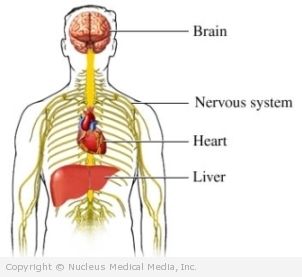Alcohol abuse and alcoholism
(Alcohol Dependence; Alcohol Use Disorder)
Alcohol abuse – Definition
Alcohol abuse is problem drinking that negatively impacts your life. For example, you may experience one or more of these issues due to alcohol abuse:
- Failure to accomplish your duties at home, school, or work,
- Involvement in dangerous drinking situations (eg, drinking and driving)
- Legal problems (eg, being arrested for drinking and driving)
- Relationship difficulties
Alcoholism or alcohol dependence is a problem pattern of drinking where you can have the same issues as alcohol abuse. Alcoholism also includes continued drinking even when there are clear problems related to alcohol that affect your physical and mental health. Relationships with family members, friends, and coworkers also suffer. Due to the more intense pattern of drinking, you may not be able to stop drinking once you start, have withdrawal symptoms if you stop drinking, and develop a tolerance (meaning you need to keep drinking more to feel the same effect).
Alcohol abuse – Causes
The cause of alcohol abuse or alcoholism is not known. The genes that you inherit from your family and the environment that you live in may play a role in developing an alcohol disorder.
Alcohol abuse – Risk Factors
These factors increase your chance of developing alcoholism:
- Gender: male
- Family members who abuse alcohol
- Starting to use alcohol at an early age
- Using illicit drugs or non-medical use of prescription drugs
- Peer pressure
- Emotional stress
- Easy access to alcoholic beverages
- Psychiatric disorders, such as depression or anxiety
- Smoking
Alcohol abuse – Symptoms
It is common to deny an alcohol problem. Alcohol abuse can occur without physical dependence.
Alcohol abuse symptoms include:
- Repeated home, school, or work problems due to drinking
- Risking physical safety while drinking
- Recurring trouble with the law, often including drinking and driving or fighting
- Having problems with relationships that are worsened by drinking alcohol
Symptoms of alcoholism include:
- Craving a drink
- Unable to stop or limit drinking
- Needing greater amounts of alcohol to feel the same effect
- Giving up activities in order to drink or recover from alcohol
- Drinking that continues even when it causes or worsens health problems
- Wanting to stop or reduce drinking, but not being able
- Withdrawal symptoms if alcohol is stopped include:
- Nausea
- Sweating
- Shaking
- Anxiety
- Increased blood pressure
- Seizures ( delirium tremens [DTs])
The brain, nervous system, heart, liver, stomach, gastrointestinal tract, and pancreas can all be damaged by alcoholism.
Alcohol abuse – Diagnosis
Doctors ask a series of questions to assess possible alcohol-related problems, including:
- Have you tried to reduce your drinking?
- Have you felt bad about drinking?
- Have you been annoyed by another person’s criticism of your drinking?
- Do you drink in the morning to steady your nerves or cure a hangover?
- Do you have problems with a job, your family, or the law?
- Do you drive under the influence of alcohol?
Blood tests may be done to look for signs that alcohol use is affecting your body, including:
- Looking at the size of your red blood cells
- Checking for alcohol-related liver disease and other health problems
Alcohol abuse – Treatment
Treatment for alcohol abuse or alcoholism is aimed at teaching you how to manage the disease. Most professionals believe that this means giving up alcohol completely and permanently.
The first and most important step is recognizing that a problem exists. Successful treatment depends on your desire to change. Your doctor can help you withdraw from alcohol safely. This could require hospitalization in a detoxification center. Health care staff will carefully monitor you for side effects. You may need medicine while you are undergoing detoxification.
Treatments include:
Medications
Medicine can help relieve some of the symptoms of withdrawal and help prevent relapse. The doctor may prescribe medicine to reduce cravings for alcohol.
Medicines used to treat alcoholism and to try to prevent drinking include:
- Naltrexone (ReVia, Vivitrol) — blocks the high that makes you crave alcohol
- Disulfiram (Antabuse) — makes you very sick if you drink alcohol
- Acamprosate (Campral) — reduces your craving for alcohol
Education and Therapy
Therapy helps you to recognize alcohol’s dangers. Education raises awareness of underlying issues and lifestyles that promote drinking. In therapy, you work to improve coping skills and learn other ways of dealing with stress or pain.
Mentoring and Community Help
Alcoholics Anonymous (AA) helps many people to stop drinking and stay sober. Members meet regularly and support each other. Your family members may also benefit from attending meetings of Al-Anon. Living with an alcoholic can be a painful, stressful situation.
Relapse is common in people who are recovering from an addiction. Treatment, like taking medicine and working with a therapist, may help reduce your chance of drinking and give you the support that you need if you do have a relapse.
If you are diagnosed with alcohol abuse or alcoholism, follow your doctor’s instructions.
Alcohol abuse – Prevention
Realizing that alcohol causes problems helps some people avoid it. Suggestions to decrease the risk of alcohol-related problems include:
- Socialize without alcohol.
- Avoid going to bars.
- Do not keep alcohol in your home.
- Avoid situations and people that encourage drinking.
- Make new non-drinking friends.
- Do fun things that do not involve alcohol.
- Avoid reaching for a drink when stressed or upset.
- Limit your alcohol intake to a moderate level.
- Moderate is two or fewer drinks per day for men and one or fewer for women and older adults.
- A 12-ounce bottle of beer, a five-ounce glass of wine, or 1.5 ounces of liquor is considered one drink.
- If you are a parent, having a good relationship with your children may reduce their risk of alcohol abuse.

